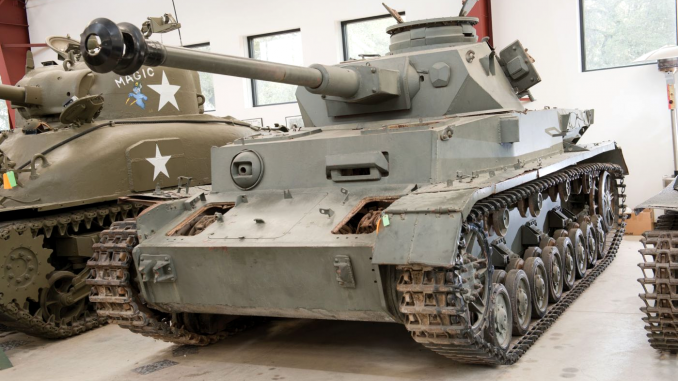
BY ELAINE GOODMAN
Daily Post Correspondent
Seventy-three years after World War II ended, a dispute over a German tank once owned by a Portola Valley collector may finally be over.
The dispute has centered on a Panzer IV tank, one piece of military memorabilia amassed by Portola Valley resident Jacques Littlefield, who died in 2009. After auction house Auctions America arranged the sale of the tank in 2014, the tank’s then-owner, the Collings Foundation, refused to relinquish it.
The buyer, Vulcan Warbirds, filed a complaint in San Mateo County Superior Court to gain possession of the tank. The case was decided in favor of Vulcan, which is headed by Microsoft co-founder Paul Allen. In May, Vulcan put the tank on display at its Flying Heritage and Combat Armor Museum in Everett, Washington.

Meanwhile, Collings filed a cross-complaint to Vulcan’s lawsuit, claiming that Auctions America owed it a $250,000 “buyer’s premium” in the sale of the Panzer IV. The buyer’s premium is a fee that is added to the amount of a successful bid at auction. The Superior Court said Auctions America must pay that money to Collings. The decision was appealed.
The First District California Court of Appeal issued a ruling in the case this month, saying Auctions America does not owe the buyer’s premium to Collings.
“This case arises out of the sale of a Panzer IV tank,” the appellate justices wrote. “While the tank is perhaps unique, the case before us is a basic contract dispute that arose in connection with an auction that included the tank, resulting in a dispute between the owner of the tank and the auction house.”
The court decision comes as the Collings Foundation has announced that its American Heritage Museum in Stow, Massachusetts, which houses much of Littlefield’s collection, will open to the public for the first time in October. The Panzer IV and other pieces of the collection were sold to help pay for construction of the museum.
“The facility will display 85 of the most historically significant military vehicles and equipment from the Jacques M. Littlefield collection in an immersive and engaging environment that will bring history alive for visitors,” the foundation said on its website.
Tank was used in Syria, captured by Israel
The Panzer IV was used by German armed forces during World War II. There are only 28 “reasonably complete” tanks remaining, with five in North America, according to the appellate court decision. The tank in question in the lawsuit was built in 1944, and eventually was moved to Syria, where it was captured by the Israeli army in the Six-Day War.
The tank was later acquired by Littlefield, who kept it at his 460-acre Portola Valley ranch in Portola Valley as part of what might have been the largest collection of armored military vehicles in the world. Littlefield owned more than 30 tanks, 13 armored personnel carriers and 12 tank destroyers, along with hundreds more reconnaissance vehicles, artillery, trucks, motorcycles and even the propeller from the Lusitania.
Littlefield and a team of experts restored the military vehicles in exacting detail. He sometimes brought them out at Fourth of July parties and used them to crush a used car to entertain guests.
Littlefield’s collection belonged to the Military Vehicle Technology Foundation, which Littlefield founded, and was transferred to the nonprofit Collings Foundation in 2013.
Collings decided to sell some of the collection to help fund construction of a new museum to display the remaining vehicles. Collings contracted with Auctions America to conduct an auction.
The two-day auction in July 2014 was seemingly a success, generating $10.24 million in proceeds from 98% of items sold. The auction included 122 military vehicles and more than 200 lots of parts and accessories.
Collectors from around the world, including Germany, Belgium and Australia, converged on Portola Valley to bid on U.S. built Sherman tanks and a Soviet missile launcher.
The top bid went to a German SD.KFZ.7 (KM M11) eight-ton half-track personnel carrier that sold for $1,207,500, “to applause from the audience,” according to a news release from Sotheby’s at the time.
But bidders failed to meet the $2.5 million reserve amount set for the Panzer IV. Vulcan representatives contacted Auctions America shortly afterward about the tank, and ultimately agreed to buy it for $2.5 million.
However, shipping of the tank was delayed. Vulcan contacted Collings and was told the foundation did not intend to sell the Panzer IV unless they could find a replacement tank, court documents said. Auctions America offered to refund the $2.5 million.
Vulcan filed a complaint against Collings and Auctions America in San Mateo County Superior Court in September 2014. The complaint alleged breach of contract and sought possession of the Panzer IV as well as damages.
Dispute went to trial
Following a four-day trial in July 2016, the court granted possession of the Panzer IV to Vulcan, rejecting Collings’ argument that Auctions America did not have authority to sell the tank.
The Superior Court also said that Auctions America owed $250,000 to Collings as a “buyer’s premium,” an issue that Collings raised in a cross-complaint to Vulcan’s case.
The appellate justices ruled in favor of Auctions America, saying the buyer’s premium applied only to the “hammer price” of items sold during the auction, and not post-auction sales of items such as the Panzer IV. And based on expert testimony, the justices said, a buyer’s premium would be paid as a commission to the auction house.
“Where the trial court got the idea that the buyer’s premium is to be shared, to be somehow a bonus to the seller, is a mystery,” the justices wrote.
The appellate court also rejected Collings’ assertion that Auctions America had made a verbal promise to give two-thirds of its 15% commission to Collings for certain high-priced items.



